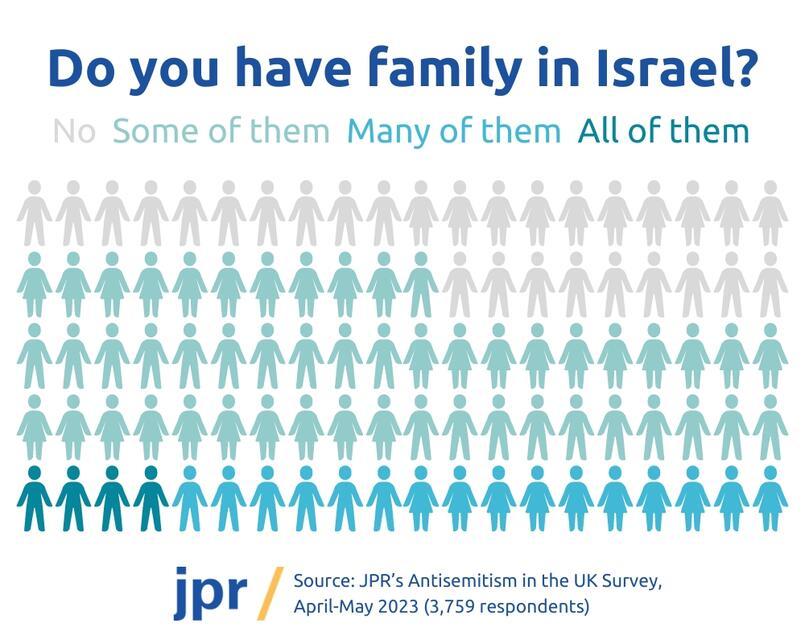With seven out of ten Jews in the UK reporting they have family in Israel, it is clear why so many are affected by Hamas's horrific attack on Israeli citizens
Dr Carli Lessof
Dr Carli Lessof
A few days ago, in his first national address following the Hamas attacks in Israel, the Chief Rabbi explained on BBC News that "there is hardly a Jewish family in the UK not affected in one way or the other by what has happened in Israel”. That evening, on Newsnight, the Jewish historian Simon Schama talked of the "agonising trauma, with the greatest number of (Jewish) deaths on a single day since the Holocaust", and expressed the same sentiment: "All of us in the United Kingdom know someone, either have family or friends… We all feel it."
This awareness of close personal connection explains why, as Jewish people speak to one another these days, they enquire carefully what news there is from family and friends. Many people who are not Jewish understand this too, sending gentle emails and messages asking tentatively if everyone is okay.
But to what extent are Jews in the UK really connected to Israel through family, and does this connection only exist for those who are religious, or who are very supportive of the State of Israel?
Just a few months ago, between April and May 2023, we asked members of the JPR research panel, "Do you have any family or relatives living in Israel?" More than seven in ten (71%) said yes, they have family in Israel, though even these figures are likely to underestimate the extent to which Jews in the UK are connected by just one step or two through friends, or family of friends.

As well as the high percentage who have family in Israel, it is striking to see how widespread this connectedness is. As we would expect, having family in Israel is equally true of men and women, as it is of adults of all ages. Also, as might be expected, there is some variation based on religious practice and community affiliation, reflecting a mix of historical and cultural patterns and behaviours. For example, over 90% of Jews who describe themselves as Haredi (Strictly Orthodox) and 84% of those who describe themselves as Orthodox (i.e., they would not turn on a light on Shabbat) have family in Israel. In part, this may reflect the common practice of young adults studying in Israel or spending a gap year there, and, particularly in the Haredi community, of young couples spending their early years of marriage there, but it may also reflect the relatively high level of immigration to Israel of more religious Jews in recent decades.
However, the numbers among other parts of the British Jewish community are just as high, sometimes even higher. For example, we see similar levels of family connection among some of the smaller communities, such as those who are members of the S&P Sephardi Community (87%) and Masorti Judaism (90%). And perhaps even more strikingly, we see that as many as six in ten Jews who self-describe as non-practising (60%) and a similar proportion identifying as Reform/Progressive (58%) also have family in Israel, representing a solid majority in both cases.
Of even greater interest, is that high levels of family connection are seen among those across the spectrum of attitudes to Israel. Certainly, the highest family connection is among those who say they are "very strongly attached" to Israel (of whom 83% have family living in Israel), in part, perhaps, reflecting a causal relationship where those with family feel a greater attachment because of these emotional ties. However, while less prevalent, it is also true of a majority of those who say they are "not at all attached" to Israel (52%).
Another interesting connection relates to respondents’ approval or disapproval of key Israeli leaders. In an earlier paper, we commented on the recent high level of disapproval of some Israeli politicians among UK Jews, as well as the high levels of concern about democratic governance, security and the overall situation in Israel. Again, even those who challenged the political situation in Israel at that time by showing their disapproval of Israeli leaders, had strong family connections, albeit in slightly lower proportion to those who favoured the status quo. It is Jews who do not have a view about these issues at all who are least likely to have family in Israel (around 60%).
Most striking, however, is that six in ten (61%) of Jews who would not describe themselves as Zionists or do not know whether they would describe themselves in that way, have family in Israel, a rate not that far below those who say that they are Zionists (75%).
Although in practice, a far higher proportion of British Jews feel attached or strongly attached to the UK than they do to Israel (70% compared to 54%), it is also clear that, however you look at it, there is often only one degree of separation between Jews living in the UK and those in Israel. So, the Chief Rabbi expresses an important sentiment that is well supported by the evidence we have about Jewish life in the UK: the events in Israel have a profound effect on the Jewish community here. These ties inevitably matter a great deal to Jews everywhere, all the more so at times of crisis, anxiety and profound sorrow.
Senior Research Fellow
Senior Research Fellow
Carli is a Senior Research Fellow at JPR, responsible for JPR’s community statistics programme, online research panel, and monitoring and evaluation. She completed her PhD...
Read more